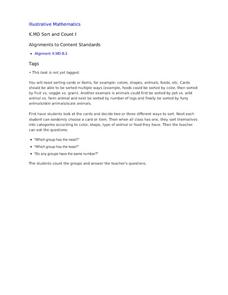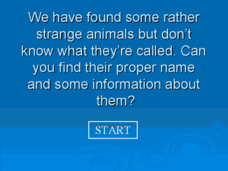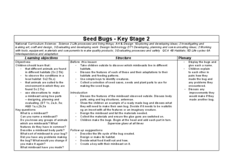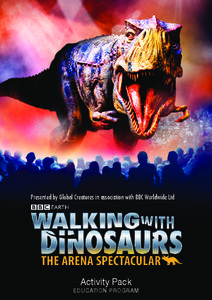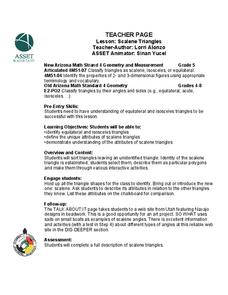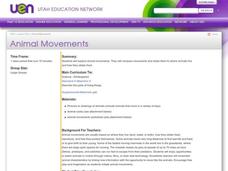Illustrative Mathematics
Sort and Count
Young mathematicians are on their feet and moving around in this primary grade sorting activity. After giving each child an object or picture card, they then sort themselves into groups, counting to see which has the most or least...
Curated OER
Animal Coverings
Students read a book. In this animal characteristics instructional activity, students read the book Animal Coverings, answer comprehension questions, and complete a chart where they match animals with their coverings.
Curated OER
Sorting the Animals
Does a fish have four legs? Of course not! Youngsters practice their counting (and animal attributes) skills as they determine which of each set of animals has a specified number of legs. They circle animals with four, six, two, and zero...
Curated OER
Classify Animals
Give your class an idea of how animals are classified by scientists with this interactive PowerPoint activity. They are presented with six different animals, they answer yes or no questions until only one animal remains alongside...
Curated OER
Investigation: Reasoning and Proof
Students explore animal characteristics by creating illustrations. In this animal identification lesson, students read a list of animal descriptions which they draw using crayons or colored pencils. Students view their drawings and...
Curated OER
Animal Classifications
Third graders work in small groups to investigate how to sort a variety of items into groups and subgroups. They work on a class chart based on the activity which show how the items are classified based on commonalities. Upon completion...
MENSA Education & Research Foundation
Kingdom Animalia: Classifying Animals
Six lessons, extension activities, and an assessment make up a series of lessons curated to reinforce the concept of classifying animals. Each informative and interactive lesson plan attributes to the knowledge of the seven levels of...
Curated OER
Classification of Animals
Students explore animal characteristics by participating in a SMART board activity. In this animal classification instructional activity, students utilize a sorting chart to divide different animal names by their observable...
Curated OER
Animal Classification
Students recognize the six groups of animals (Mammals, fish, birds, reptiles, amphibians and arthropods) and their characteristics. In this animal characteristics lesson, students sort animals by their traits. Students cut...
Curated OER
Shapes
Students identify attributes of different geometric shapes. In this geometry lesson, students view a PowerPoint presentation on shapes and use attribute blocks to examine the corners and edges of each shape. Students work together...
Curated OER
A Planet Full of Animals
Students study animals and practice classifying them through observation activities. In this animal classification instructional activity, students complete a KWL chart about animals. Students then sort pictures of animals into chart...
Alabama Wildlife Federation
Fill the Bill
A hummingbird isn't the only bird with a unique beak. After a discussion about the specific characteristics of bird beaks, pupils complete a station rotation and use different tools to simulate the function of different beaks. They...
Curated OER
An Introduction to Acids and Bases
Students explore acids and bases. In this lesson about acids and bases, students do an experiment to test certain items to determine what they are. Students use cabbage and litmus paper as indicators. Students understand how to sort the...
Curated OER
Animal Movements
Learners discuss the behavior of different animals and how they move. They explore the ways that this helps them live and find food in their environment. They participate in a game that requires them to mimic the ways in which animals move.
Curated OER
Seed Bugs; Stage 2
Students examine nature by participating in an environmental art activity. In this imaginary creature lesson, students discuss the importance of a habitat when pertaining to wild animals or bugs. Students utilize tree parts which they...
Curated OER
Sea Animal Slide Show
Students cllassify sea animals into groups based on certain attributes. They create a picture on ClarisWorks for Kids. They write/wordprocess their own name and copy words from immediate environment to label sea animals.
Curated OER
Small and Large Squares
Young mathematicians classify squares according to attributes. They sort squares according to specific attributes. Students explore squares in repeating patterns and order squares according to size. Engaging extension activities are...
BBC
Walking with Dinosaurs
Breath new life into your class's study of dinosaurs with this extensive collection of materials. Offering everything from a printable T-rex mask, word searches, and connect-the-dots activities to informational handouts, hands-on...
Curated OER
Scalene Triangles
Fifth graders identify and classify scalene, equilateral, and isosceles triangles. In this triangle lesson, 5th graders define the different attributes of 3 types of triangles and sort them by descriptions and...
Curated OER
Animal Movements
Students will explore animal movements. They will compare movements and relate them to where animals live and how they obtain food.
Curated OER
Magician Squares
Elementary school learners investigate the attributes of a square. They discover that squares are polygons and examine squares found in everyday life. They concentrate on connecting the word, square, with the shape. As an...
Curated OER
2-D and 3-D Presents at Pedro's Party
Fifth graders draw 2-D and 3-D shapes. They sketch and label geometric figures with correct terminology, then explore parallel and perpendicular lines. Pupils sort and classify shapes drawn.
Curated OER
Science: Teddy Bear Nation
Students sort teddy bears according to types and then graph the results. They each bring a bear to class and then discuss their similarities and differences. Once the bears have been sorted into groups according to size and color,...
EngageNY
Interpreting the Graph of a Function
Groups sort through NASA data provided in a graphic to create a graph using uniform units and intervals. Individuals then make connections to the increasing, decreasing, and constant intervals of the graph and relate these...
